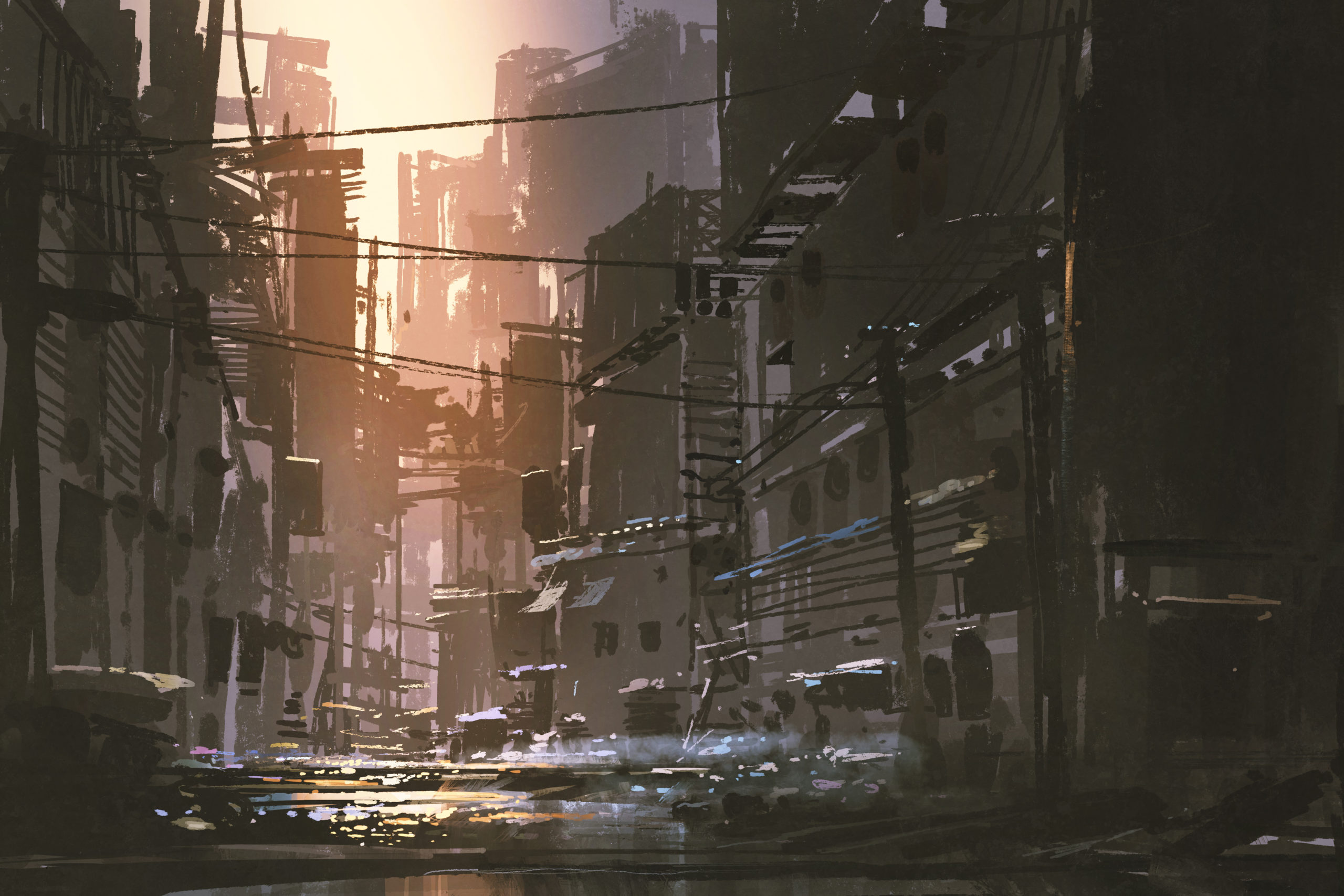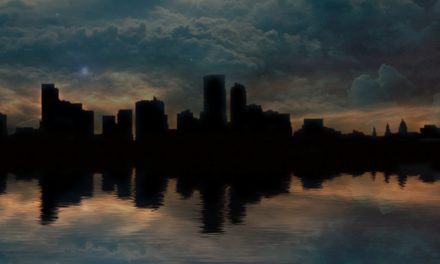The 74th District
by Wen-yi Lee
Issue 11: Governance | 2,774 words

untitled © grandfailure/Adobe Stock
When the mayor had come to her, personally, to ask if she would be standing administrator of the new city division, she’d been overwhelmed. Fresh out of grad school, with okay grades and a transparently desperate public policy resume stacked on top of her paper-thin philosophy degree, Jaime Kansen had expected to have to sacrifice herself at the altar of overworked internships and brunch schmoozing to get anywhere near office. But now here she was, the first councilor of Raspa’s new 74th District, living population: one.
From her office’s bay windows, she could see orange sirens flashing over chicken wire perimeter fences. Everything from the streets to the coffee smelled like death. But so far, her eight months in office for the Recently Returned hadn’t been too bad. Better, anyway, than the 25th through 38th Districts, which had a serial killer running around.
It was another day. Jaime arrived at the office at half past seven, sharp, and was pleased to find breakfast on her desk.
“Coffee—one milk, one sugar—and a plain chocolate donut,” her personal assistant chirped happily as Jamie shrugged off her coat and set her bag down.
Sahla, the gods bless her, had been a miracle find. When setting up the District, Jaime had sat through boxes and boxes of files on her new constituents, taking note of what they had worked as when they had been alive, the first time, then allocating each a proper job. Sahla was barely eighteen—the age of unpaid internships and coffee runs. In fact, she’d been killed on such a coffee run—shot by a wayward mugger. She and the no-fat, oat-milk latte were left to spill over the concrete, foam trickling into the sewer drains. A pro bono necromancer with good intentions had brought her back, only to find her parents were ardently religious and wouldn’t go anywhere near their resurrected daughter.
Their loss was Jaime’s gain. Sahla had adapted rapidly and proven to be keen and smart and an excellent memorizer of drink orders, and you couldn’t even see the bullet wound once she buttoned up her shirt. As Jaime sipped her coffee and breathed in the heady, caffeinated steam, Sahla rattled off the day’s order of business. Most of the list consisted of recurring problems that had been carried over for weeks—determining hygiene measures for the Class 4 Returned who were in some stage of decomposition; meeting again with the Education Board to discuss the reorientation syllabus for all Class 2 and up, those who had missed more than half a year of life; reviewing the proposed plans for the park with putrefaction-resistant horticulture; taking a late afternoon trip to the City Council to debate new regulations on necromancy. She let Sahla talk, impressed by the girl’s attention to detail, and thought about giving her a raise before the end of the year.
“Wait.” Jaime snapped to attention, mind catching up. “What was that last one?”
“Mr. Fletcher from the bookstore wants to talk about the shipment of A Guide to Reliving—”
“No, before that.”
Sahla glanced down at her clipboard. “You have a meet-the-people session scheduled for two to four o’clock.”
“That’s today?” Jaime pinched the bridge of her nose. “Right. Of course. Do we know how many we’re expecting?”
“I heard the Enlightened Legion over on Silence Street are still petitioning for their forum.”
“Damn Carlisle Grace,” Jaime muttered. “That’s one thing I’m going to take to the Council. Not letting historians become necromancers, at least not in this city! They raise desiccated lost civilizations for their research—and then what? Then we have to deal with them.”
“At least you don’t have to worry about putrefaction from the Class 5s,” Sahla pointed out.
That was true. The Enlightened Legion—former kings, crusaders, and builders of temples who had been enthusiastically excavated from limestone graves—were all bones. From a public health standpoint, once they had been quarantined, they were actually much more manageable than those halfway-gone corpses seeping gases and pus from their yellowed skin.
Jaime drained her coffee and set the cup down with a decisive thump. “All right. Let’s get to work.”
••••
In university, before necromancy had upended everything, they had talked about death. Dr. Dahn, the professor of her Moral Philosophy class—back when only philosophers cared to devote hours debating death—had looked close to death himself, with hair like spiderwebs, skin like parchment. Is death, they had asked, so villainized in popular culture, inherently harmful? Death, Dr. Dahn had proposed, is bad for us only insofar as it deprives us of the good we might experience, and not because it is intrinsically evil.
And so on and so forth.
What about undoing death, then? If death was not inherently bad, then surely undoing it was not inherently good. When necromancers had first started seeing successes, and then again when the Guild had been formed, the question had been argued everywhere, from talk shows to parliament to preachy think-pieces. If the harmfulness of death was evaluated on the quantity of future welfare thus deprived of the dead person, how then was the benefit of resurrection quantified, and then justified?
It hadn’t been universally resolved, to say the least, but it had been resolved enough for a simple majority, and really that was all that mattered.
A few years ago, undoubtedly in some industrially lit coffeehouse, Jamie might have sat and debated the philosophical implications and moral motivations of resurrection with classmates who had the luxury of youth to explore the abstract over cappuccinos and croissants. But now, there was barely time on the schedule to take a shit, much less to muse about ethics. The debates could save themselves for Parliament. In the meantime, the practicalities of necromancy consumed all the time she had; they were spilling onto the pavement outside the City Council, a long line of grievances waiting to be heard. Complaining was a human quality that apparently never died. Regardless of years in the ground.
Sighing, she flipped open her notebook, shuffled in her chair, and waved at Sahla to let the first constituent in.
The minutes ticked away. The Enlightened Legion clacked across the floor in their rusting armor and empty scabbards and chattered on about their forum, emphasizing the need for a public speaking space. Jaime listened patiently and promised it would be on the agenda for the next Council meeting. As soon as they went off, Deanna Koe stepped in. A veterinary student before her tragic car crash, she had ideas for bringing animals into the District. Marsh Schwab, a graffiti artist who had been mistaken for a robber and shot on the street, was given permission to paint a mural in the town square. Jaime would never have imagined herself enjoying a job like this in the past, but as much as she bemoaned meet-the-people sessions, the young residents, in particular, had swayed her over time. They weren’t much younger than she, and, implanted into a new place, they seemed to thrive on trying to make it a better one.
And there was a disproportionate number of them. Besides the ancients dug up by overenthusiastic researchers, it was usually young deaths that were green-lit for resurrection. Returning to the arguments from Dr. Dahn’s class, it made sense; the young had the most to lose from their deaths.
Wouldn’t she know.
“Jaime Kansen!”
Jaime looked up, startled, to find someone who had certainly never died taking the constituent’s seat. Even with short hair slicked back against his scalp, a nice suit, a goatee, and eight more years of age—even then—Jaime recognized Novan Cetor, an old university classmate. “Novan? What are you doing here?”
“Well, I sent you a message last week and got no reply, so I decided to come to your meet-the—” He paused and looked over his shoulder at the man standing next in line, half his skin grey. “—people session.”
“Apologies,” she said, through slightly gritted teeth. She was quickly remembering why she had never been friends with him in school. “I have a lot of backlog.”
He looked her up and down and laughed. “Jaime Kansen, public servant. I heard you did a postgrad at the Policy Institution?”
“Yes.”
“Weren’t you the one who proclaimed structure was meaningless?” He glanced at one of the pamphlets stacked on her table. “We’ll make your new life better for you. Cute slogan.”
“What do you want?”
He turned a white-teethed grin on her, the kind she instantly recognized from all the other smarmy businessmen her tenure had brought her to tables with. “Well, I represent a rapidly expanding industrial firm.”
“Corporate. Why am I not surprised?”
“We’ve been in talks with the mayor about setting up a new waste facility, somewhere in Raspa. It’ll halve the time for waste disposal and triple our efficiency. He told me to come talk to you, because apparently, you’ve got special jurisdiction now. Governor of the walkies and all that.”
Jaime ignored the slur. “You want to set up your waste facility here?”
“It’s a perfect location. Within ideal proximity, far enough from the urban center.”
“This is an urban center.”
“Of living people.”
“They are living.”
“Of people who haven’t died before,” he amended again, his smile beginning to slip.
“The Necromancy Ethics Committee declared the residents of this District Raspa citizens,” she reminded him. “We’re still struggling to set up the new division. We don’t need a toxic waste site to add on top of that.”
“Oh come on, Jay-Jay. If everything were really so free and equal, there wouldn’t be chicken wire around your constituency. If this place were so important they wouldn’t have shafted you here. It’s cute you’re so invested, but boosting our productivity could rake in millions for Raspa as a whole. And what’s the waste going to do? Kill them again?”
She had had enough. “Leave.”
He narrowed his eyes. “We can talk about this like adults, Jaime.”
“Leave, or I’ll have you escorted out. You’re not a constituent, and you’re wasting my time.”
He gazed at her steadily, then rose, dusting off his dress pants. “We’re bringing this to City Council soon, like it or not. It would be nice to have you there to facilitate the plans. You could work out what would be best for the District.”
“I am.”
He shook his head and turned on his heel. She waved in the next man, but found herself watching Novan’s coattails flap through the door.
Holding an apologetic hand up to the newest petitioner, she waved Sahla over. “Pop down to the gates,” she murmured. “See if any necromancers are around.”
As Sahla slipped away, Jaime turned back, laced her fingers over the tabletop and smiled. “Sorry about that,” she said. “How are you today?”
••••
Driving through the 74th District, the streets blurred by quickly enough to keep you from noticing that some of the pedestrians were in states of decay. It was a serene little place, sectioned off from the 72nd and 73rd Districts, barely a few city blocks, but Jaime felt a glowing sense of pride when looking at it. It was the same rush of creative joy she’d felt as a child making cities out of wooden blocks and gathering her dolls to celebrate the rule of the benevolent queen, who was a porcelain woman with a crack in her head that her mother had banished from the mantlepiece. It was a large diversion from her undergraduate days, as Novan had snidely pointed out, but she enjoyed the sense of order—the god-play, if she was honest with herself—that came with the power to sign into being gardens on city corners, lights above streets, roofs over people’s heads.
The taxi pulled up in front of the dilapidated apartment building on the corner of Muyr Street. She frowned. “Sahla, note down this address for refurbishment.”
“That’s my building next door,” the taxi driver said hopefully. He’d been killed by a drunk driver. His head was still slightly lopsided, but the ride had been perfectly smooth. “Little peeling too, if you know what I mean.”
Jaime counted out the fare. “Note down the next building too, Sahla.”
The driver beamed.
They were exactly on time. As they got out of the car, the building’s doors opened, and a tall man came pattering down the steps. “Taxi!” he exclaimed, waving his hand.
Jaime caught his arm. “Hang on, Awakener.” She signaled for the driver to wait, then pulled the necromancer aside. He was one of the younger ones who did more pro bono work and even visited their resurrections in the 74th District. Sahla’s necromancer even bought her a re-birthday card for the anniversary of her resurrection. They were the most convenient way to speak to a necromancer without having to pass the border and seek out the Guild. “I’m Jaime Kansen, the District councilor.”
He nodded. “I’ve heard of you.” His eyes darted to the stalled cab.
“The Guild is committed to the well-being of its resurrects, yes?”
“Of course.”
“What does the Guild believe of death?”
He looked alarmed at the interrogation. “Well—it’s a transitive state between periods of existence.”
“Is it good, or is it evil?”
“Well—neither. It’s nothing.”
“Then,” she said, “I have a proposal I would like to make to the Guild.”
••••
“Councilor Kansen, your eleven o’clock is here to see you.”
Jaime nodded and waved for Sahla to open the door. She set aside her pen and rose as Daphne Abrin walked into her office. The older woman reminded Jaime of her mother in many ways—the knit shawl drawn around her shoulders, the discerning slant to her eyes, the kind quirk to her mouth. What the woman wore that Mrs. Kansen certainly would not, however, were bone bracelets, one around each slim dark wrist and inscribed with the arcane marks of a master of the Necromancers’ Guild.
“Awakener Abrin, I trust it went well?”
Abrin inclined her head fractionally. “Without a hitch. He’s downstairs now.”
“Your efficiency is appreciated. Leave the paperwork with my assistant, will you?”
Abrin nodded and handed Sahla a thick envelope stamped with the crossbones of the Guild. “Shall we, Councilor?”
Jaime followed the necromancer out of the office. Abrin folded her hands in front of her as they walked, crossing one manacle over the other. “You’ve set a precedent, Councilor.”
Abrin glanced out the window, surveying the street below. This side of the building overlooked the town square where Marsh Schwab’s newly painted mural leaped vividly across the walls. “What is death when it is rendered temporary? What is murder? A qualification of violence, of inconvenience rendered? Of physical distortion to the body? Mental? The lawyers are scrambling.”
“You sound like a teacher I once had.”
Abrin snorted.
They went down the stairs to the lobby, where three figures waited for them. She suppressed a smile and came face-to-face with her old classmate. “Hello, Novan. You’re looking well.”
His nostrils flared, and he jerked at her. The two officers flanking him clamped warning hands on his shoulders, and he slumped back. She studied his face, marveling at Abrin’s work. His face was a little sallow, but, save that and the faint pink line necklacing his throat, there was no evidence that he had been dead for two weeks.
“How are you feeling? The Return can be jarring, but I promise you haven’t missed much. It shouldn’t be too disorienting to get back on your feet. Pity,” she said matter-of-factly, “that you missed the Council meeting. I convinced them that putting the waste site here wasn’t in their best interest, after all—it’s going to be built offshore on Peak Island. Of course, you won’t be able to be involved anymore, seeing as it’s past the bounds of the Returned sector. But don’t worry, a few weeks of orientation and counseling, and we should be able to start building you a new life right here in the 74th District.”
He stared at her murderously. She would have to be a little careful going forward. Maybe post a few new guards.
“Right now, we’ll get you started on the registration process and send you to your new supervised apartment.” She motioned for Sahla to bring forward the standard forms. “There are pamphlets in the welcome packet to give you an overview of the district. If you have any concerns, do feel free to bring them to me. I have meet-the-people sessions every two weeks, right here in the City Council chambers.” She smiled. “We’ll make your new life better for you.”

Wen-yi Lee
Wen-yi Lee is a writer from Singapore. Her writing has been published by or is forthcoming in Strange Horizons, Luna Station Quarterly, Sword & Kettle Press, and now Speculative City. She is also the founder and editor-in-chief of Amber: The Teenage Chapbook, an online literary magazine spotlighting teenage Singaporean writers. She can be found on Twitter @wenyilee_.




